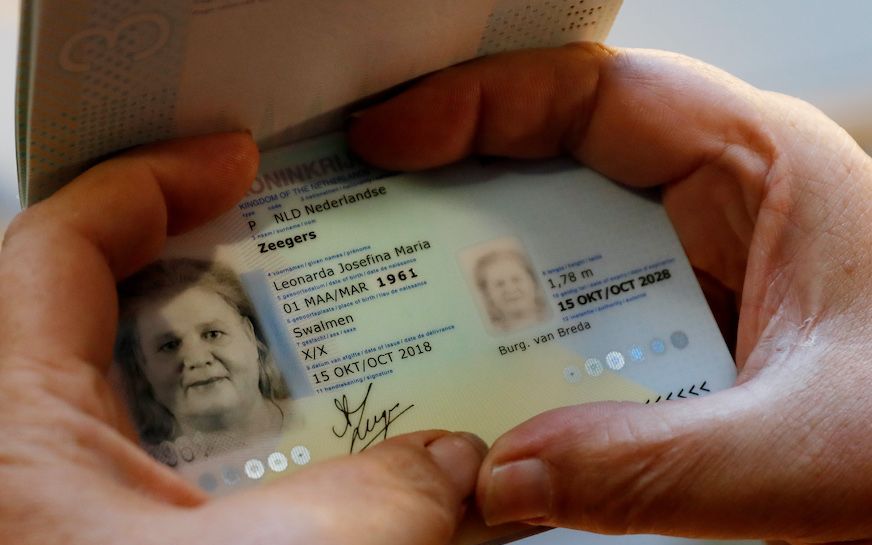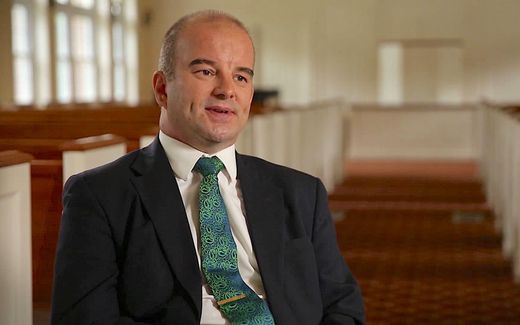Dutch sceptical about transgender law
01-02-2022
Western Europe
Tineke van der Waal, RD

The first Dutch passport with an X as sex assignment. The owner was born as a woman but the judge agreed that she had the right to receive a passport without a gender assignment. Photo ANP, Bas Czerwinski
Western Europe
Most of the Dutch population consider an expert statement and a minimum age of 18 crucial for changing the sex on the birth certificate.
This is evident from an independent poll commissioned by the Christian organisation NPV-Zorg voor het leven (a pro-life movement that approaches medical developments from the Christian perspective, ed.).
The poll conducted by the Amsterdam-based agency DirectResearch makes it clear that there is no support among the Dutch population for the transgender bill proposed by former ministers Dekker (Legal Protection, ed.) and Van Engelshoven (Education, Culture and Science, ed.). The Lower House of the Parliament will soon give its opinion on the bill, which is intended to promote the emancipation of transgender people.
If the bill becomes law, it should become easier to change gender legally. The expert statement and the minimum age of 16 have been scrapped. It means that a doctor’s or psychologist’s certificate is no longer needed. Also, young teenagers can change their gender on their birth certificate, passport and identity card without their parents’ consent.
Conditions
The majority of those questioned –a representative group of 1083 Dutch people– find it essential that certain conditions are met before a legal sex change can take place. For example, the largest group of respondents opts for a minimum age of 18 years (40 per cent), while 26 per cent considers the age of 25 appropriate, “when the brain is fully grown.” Others find 16 years (24 per cent) suitable.
When asked whether a statement from a doctor or psychologist is necessary, 52 per cent gave a positive answer; only 14 per cent disagreed. For 36 per cent, an X on the birth certificate is also possible, instead of an M or V. For a small group, gender reassignment is not an option at all (13 per cent).
Gap
The research exposes a gap between politicians and Dutch citizens, says Diederik van Dijk, NPV-Zorg voor het leven director. “Most Dutch people understand that changing gender is not just something that should be as easy as possible. It applies especially to children. For them, such a change can have far-reaching consequences that they cannot always oversee. Moreover, gender matters, whether in health care, combating domestic violence and crime, or other areas. This bill means that anyone who wants to can change their gender, without any control.”
According to Van Dijk, politicians need to tread water on the issue of transgender legislation. “It is time that politicians have an eye for the real concerns of citizens. There must first be room for social debate.”
Mental disorder

The poll conducted by DirectResearch clearly shows that there is no support for the law, also concludes Elise van Hoek, manager of research and policy at the NPV.
What do you notice in the results of the survey?
“People do not want to make it easier but rather more difficult to change sex legally. They appear to favour retaining the minimum age and opt for 18 years or even 25 years – a tightening of the current law, which sets 16 years as the limit.
People see gender reassignment as an extension of other age and legal capacity choices, such as driving a car and drinking alcohol. So, in effect, they are putting the brakes on. That is a clear signal that comes through in this survey.”
Why is the NPV conducting this poll?
“It is striking that there is no debate about the law, while it is not only about transgenders, but affects everyone. As NPV, we think it is important that an open conversation occur because this is an important change in the law.”
Does the NPV consider emancipation of transgender people as a problem?
“We are against discrimination against anyone. The point is that this law touches on much more than whether you can change your gender. It is about how we define sex. If we consider gender more important than sex and feelings more important than biology, this has far-reaching consequences. I am thinking of policy, language and the social order. This law does not lead to emancipation but confusion.
It is striking that evolutionary biologists abroad are actively involved in this debate. They see self-identification, where feelings determine what someone is, as a significant problem, because it is at odds with biological reality. According to them, the idea that there is more than just man and woman also lacks any scientific basis.”
To what extent Dutch people are well informed about this topic?
“About a third of the respondents do not seem to know what the law is about. This is understandable, as there is hardly any debate now.”
In countries where legal gender reassignment is already facilitated, incidents occur. Do respondents see possible abuse of the law as a risk?
“We did not ask for this explicitly. Fraud and abuse do come up in answers to the open-ended questions. With fraud, you can think of the effect on data files. Abuse affects physical reality. The law makes it possible for biological men to enter women’s spaces, such as changing rooms, toilets and saunas, which evokes adverse reactions among women. It also affects the sports world.
The transgender law is intended for a small group of transgender people, but it opens the door for anyone who wants to use or abuse it. That is why this proposal must go back to the drawing board. We must first discuss this. We hope that other parties will also make themselves heard.”
Can the law be profitable for transgender people?
“The law is not the answer to the current developments in transgender care. The proposal to lower the age limit for legal gender reassignment could have far-reaching consequences for young teenagers, with parents being left out. We find this risky for teenagers and their relationship with their parents. We know that the number of girls who identify as boys has tripled in a short time. We cannot ignore that. Can teenagers foresee the consequences of gender reassignment?
Gender dysphoria is a mental disorder. We advocate that people who struggle with it get appropriate support. Other problems, such as autism, often manifest themselves at the same time. This calls for good care, which is broader than the single wish for gender reassignment.”
This article is a compilation of two articles that were published previously in the Dutch Reformatorisch Dagblad on 31 January 2022, namely Nederlander sceptisch over transgenderwet and “Wet zorgt niet voor emancipatie, maar voor verwarring”.
Related Articles





